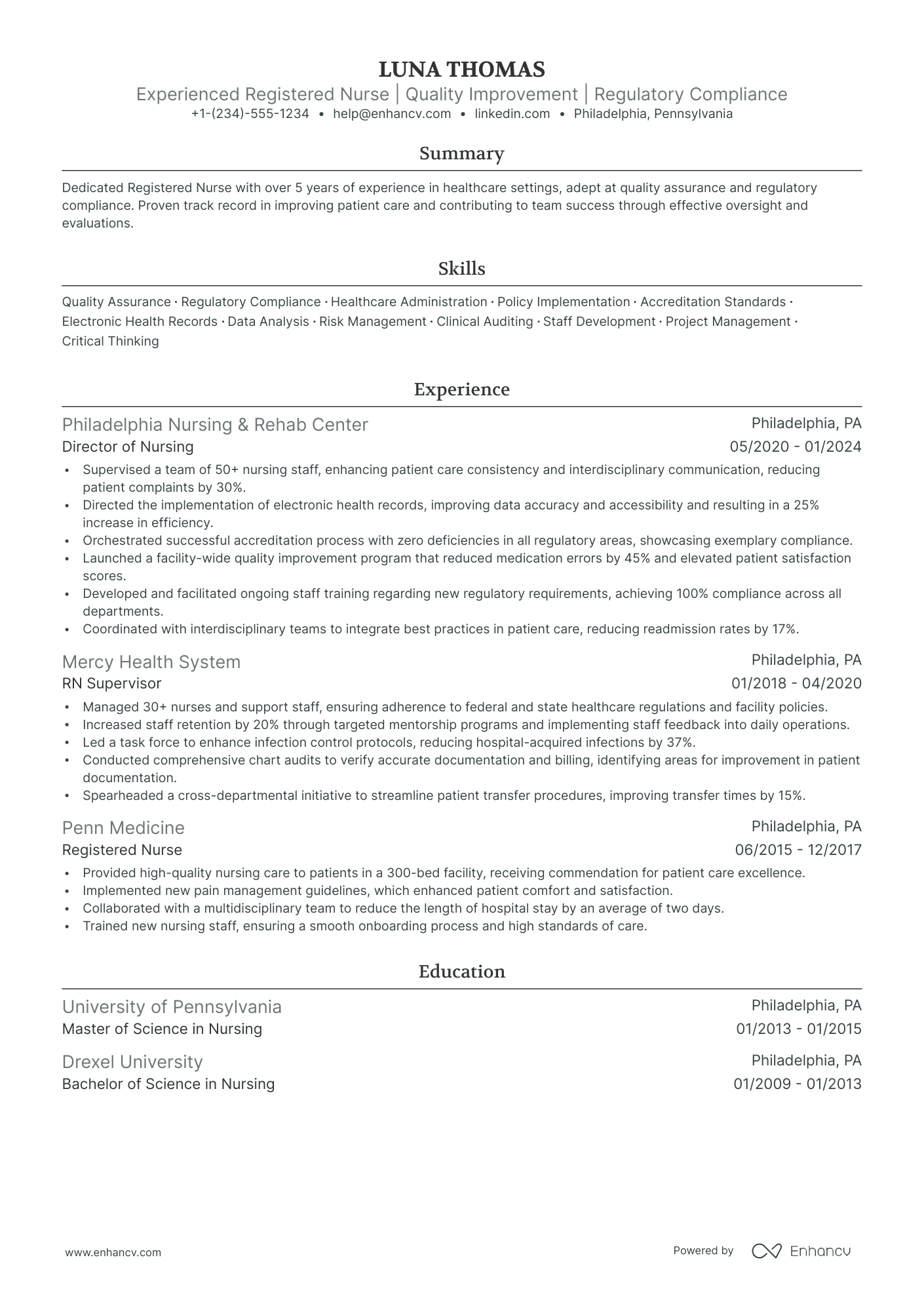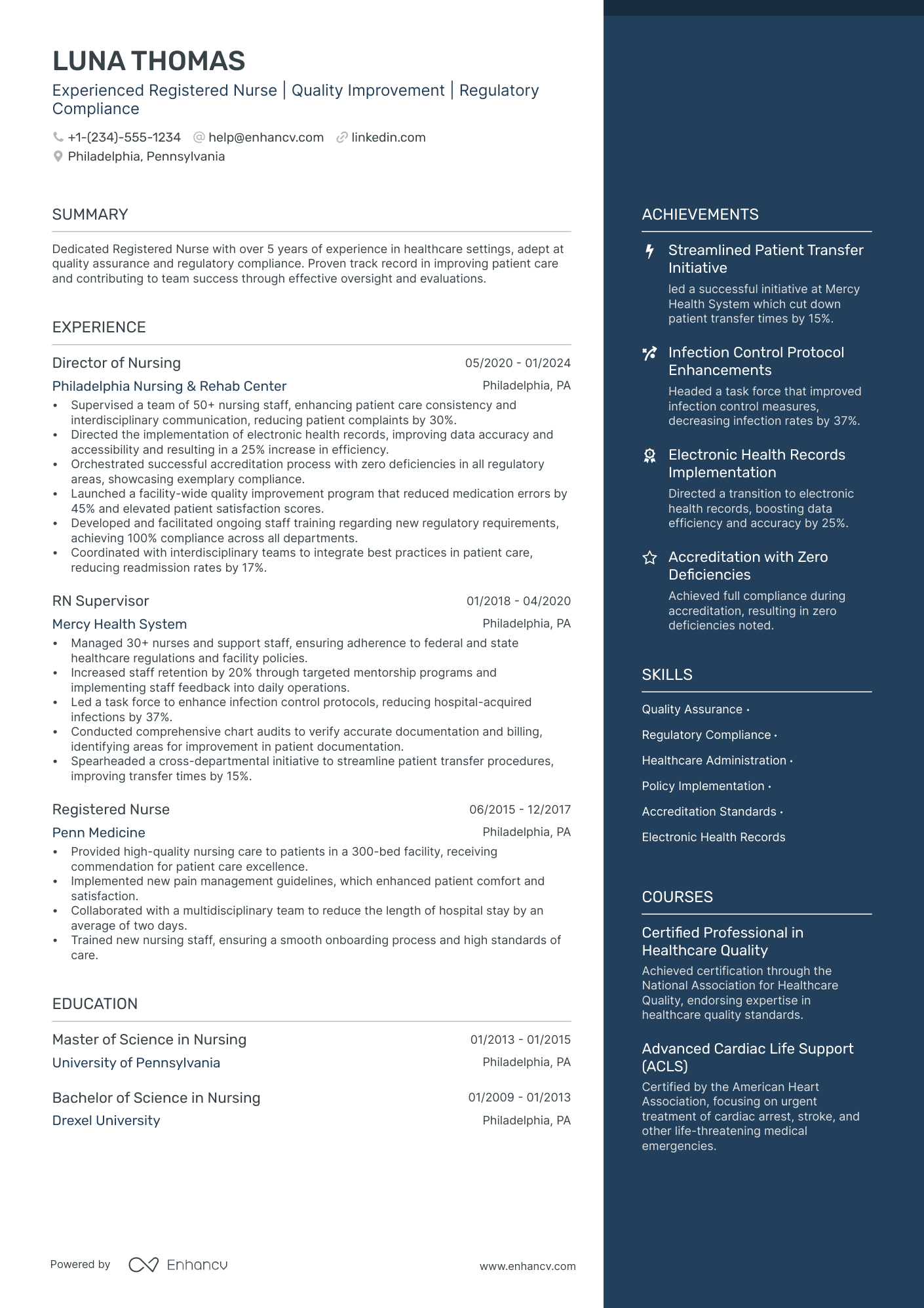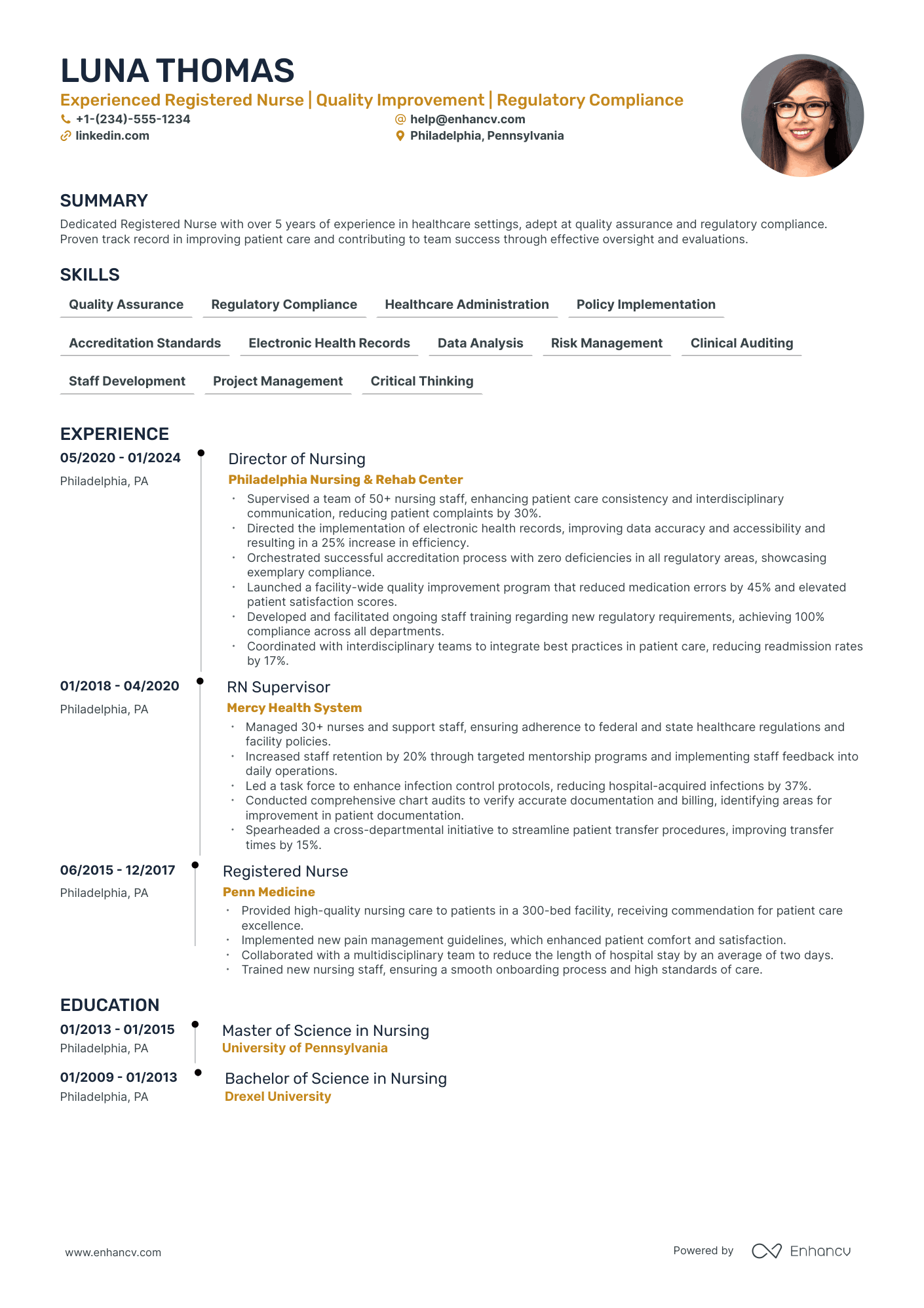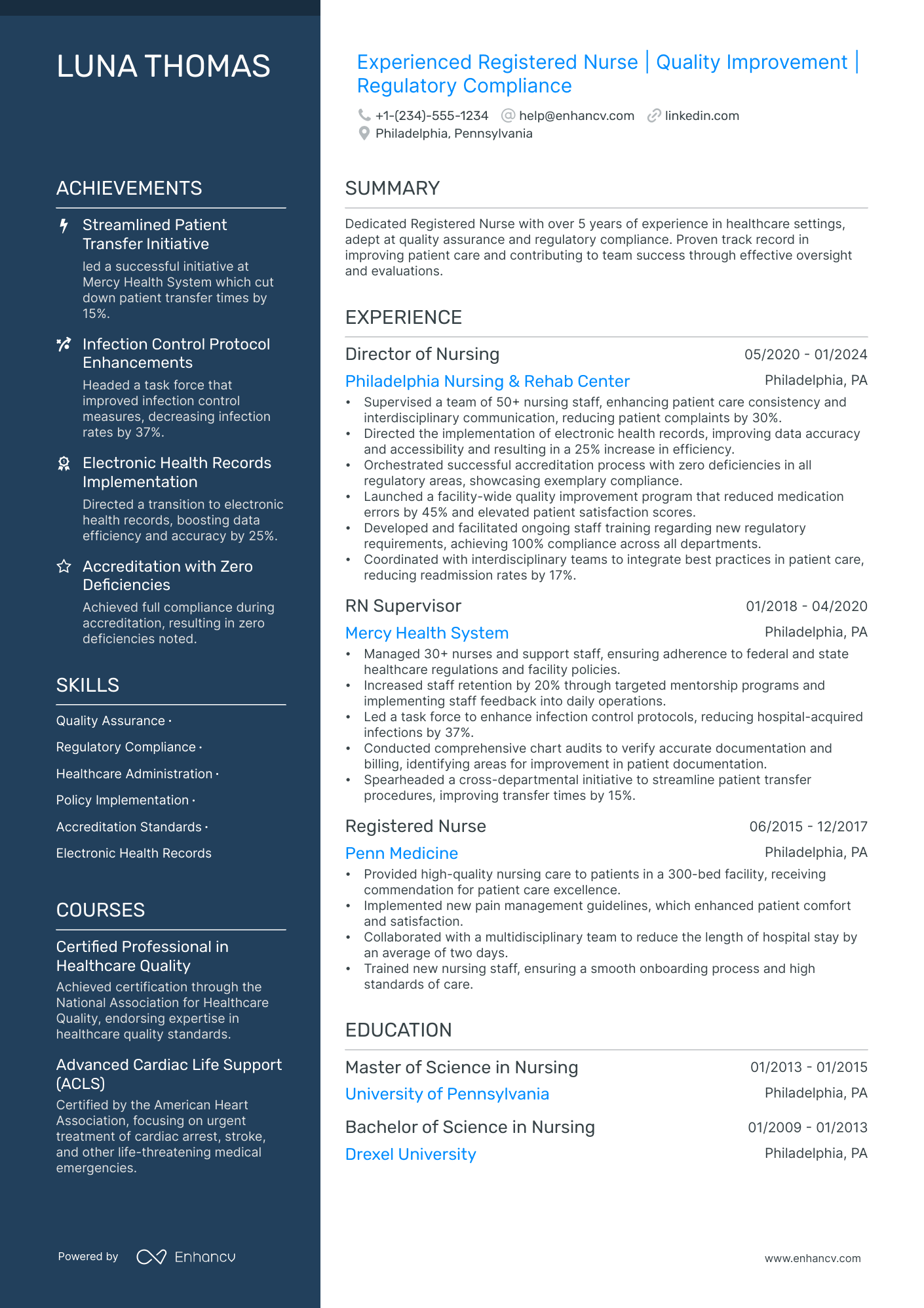As a charge nurse, articulating the balance between your leadership roles and clinical responsibilities on your resume can be a significant challenge. Our guide offers tailored strategies to help you effectively showcase your multifaceted experience, ensuring your resume stands out to potential employers.
- Format your charge nurse resume to ensure that it balances professionalism with creativity, and follows the best practices.
- Match the charge nurse job requirements by including industry keywords on your resume.
- Use various resume sections to showcase your skills and achievements to answer why you're the best candidate for the charge nurse role.
Take inspiration from leading charge nurse resume examples to learn how to tailor your experience.
- Clinical Nurse Resume Example
- Nurse Extern Resume Example
- Nurse Manager Resume Example
- Pediatric Dentist Resume Example
- Public Health Resume Example
- Head Nurse Resume Example
- Long Term Care Pharmacist Resume Example
- Medical Scribe Resume Example
- Surgical Nurse Resume Example
- Pediatric Dental Assistant Resume Example
Designing your charge nurse resume format to catch recruiters' eyes
Your charge nurse resume will be assessed on a couple of criteria, one of which is the actual presentation.
Is your resume legible and organized? Does it follow a smooth flow?
Or have you presented recruiters with a chaotic document that includes everything you've ever done in your career?
Unless specified otherwise, there are four best practices to help maintain your resume format consistency.
- The top one third of your charge nurse resume should definitely include a header, so that recruiters can easily contact you and scan your professional portfolio (or LinkedIn profile).
- Within the experience section, list your most recent (and relevant) role first, followed up with the rest of your career history in a reverse-chronological resume format .
- Always submit your resume as a PDF file to sustain its layout. There are some rare exceptions where companies may ask you to forward your resume in Word or another format.
- If you are applying for a more senior role and have over a decade of applicable work experience (that will impress recruiters), then your charge nurse resume can be two pages long. Otherwise, your resume shouldn't be longer than a single page.
Upload & Check Your Resume
Drop your resume here or choose a file. PDF & DOCX only. Max 2MB file size.
PRO TIP
If you're in the process of obtaining your certificate or degree, list the expected date you're supposed to graduate or be certified.
Don't forget to include these six sections on your charge nurse resume:
- Header and summary for your contact details and to highlight your alignment with the charge nurse job you're applying for
- Experience section to get into specific technologies you're apt at using and personal skills to deliver successful results
- Skills section to further highlight how your profile matches the job requirements
- Education section to provide your academic background
- Achievements to mention any career highlights that may be impressive, or that you might have missed so far in other resume sections
What recruiters want to see on your resume:
- Proven leadership experience and management of nursing staff
- Expertise in patient care coordination and clinical workflow optimization
- Strong decision-making skills and crisis management experience
- Demonstrated ability to implement and monitor healthcare policies and procedures
- Effective communication and interpersonal skills with multidisciplinary healthcare teams
Guide to your most impressive charge nurse resume experience section
When it comes to your resume experience , stick to these simple, yet effective five steps:
- Show how your experience is relevant by including your responsibility, skill used, and outcome/-s;
- Use individual bullets to answer how your experience aligns with the job requirements;
- Think of a way to demonstrate the tangible results of your success with stats, numbers, and/or percentages ;
- Always tailor the experience section to the charge nurse role you're applying for - this may sometimes include taking out irrelevant experience items;
- Highlight your best (and most relevant) achievements towards the top of each experience bullet.
You're not alone if you're struggling with curating your experience section. That's why we've prepared some professional, real-life charge nurse resume samples to show how to best write your experience section (and more).
- Successfully managed a 20-bed high acuity cardiac care unit, leading to a 15% improvement in patient satisfaction scores.
- Implemented a new electronic health record system, which decreased medication errors by 30%.
- Coordinated interdisciplinary team meetings to develop patient care plans, improving discharge planning efficiency by 25%.
- Oversaw staffing and resource management for a 30-bed surgical unit, resulting in a 20% reduction in overtime costs.
- Mentored and trained a team of 15 nurses, elevating overall unit performance and enhancing staff retention by 10%.
- Co-facilitated a successful Joint Commission accreditation process, ensuring compliance with healthcare standards and regulations.
- Directed nursing operations in a pediatric intensive care unit, contributing to a 5% increase in patient survival rates.
- Pioneered a patient-family engagement program that bolstered family satisfaction scores by 18%.
- Managed the integration of new life-support technologies, enhancing the unit's capabilities for treating critical cases.
- Facilitated the successful transition to a patient-centered care model, boosting patient adherence to treatment plans by 22%.
- Implemented cost-saving measures in procurement of medical supplies, saving the hospital approximately $50,000 annually.
- Championed a continuous professional development program for the nursing staff, reducing turnover rates by 12%.
- Devised and executed a wound care protocol that decreased healing time by 30% and reduced readmissions due to infections.
- Played a pivotal role in a research project on the efficacy of different IV antibiotics, influencing hospital-wide treatment protocols.
- Streamlined the patient handoff process, shortening the average patient transfer time by 15 minutes, thus enhancing patient flow.
- Orchestrated the day-to-day activities of a 25-bed oncology unit, achieving a 95% patient satisfaction rate.
- Initiated an advanced palliative care program, aiding in the provision of compassionate end-of-life care and supporting patient dignity.
- Spearheaded a digital documentation initiative that cut down administrative time for nurses by 20%, reallocating those hours to direct patient care.
- Led a team of nurses in an emergency department that treated an average of 150 patients daily, maintaining operational excellence and quick response times.
- Developed a triage training program that improved initial patient assessment accuracy by 40%, enhancing the ER's effectiveness.
- Collaborated with IT specialists to tailor an ER-specific software tool that streamlined patient tracking and reduced average wait times by 15 minutes.
- Supervised a team in a long-term care facility with a resident population of 120, focusing on improving quality of life and care standards.
- Increased staff compliance with infection control procedures by 95%, dramatically lowering incidence of facility-acquired infections.
- Revitalized the resident nutrition program by collaborating with dietitians, leading to a 10% drop in malnutrition-related complications.
The following content includes information from "O*NET OnLine" by the U.S. Department of Labor, Employment and Training Administration (USDOL/ETA). Used under the CC BY 4.0 license. The data represents the top responsibilities present on the task lists for charge nurse professionals.
Top Responsibilities for Charge Nurse:
- Record patients' medical information and vital signs.
- Administer medications to patients and monitor patients for reactions or side effects.
- Maintain accurate, detailed reports and records.
- Monitor, record, and report symptoms or changes in patients' conditions.
- Provide health care, first aid, immunizations, or assistance in convalescence or rehabilitation in locations such as schools, hospitals, or industry.
- Consult and coordinate with healthcare team members to assess, plan, implement, or evaluate patient care plans.
- Direct or supervise less-skilled nursing or healthcare personnel or supervise a particular unit.
- Instruct individuals, families, or other groups on topics such as health education, disease prevention, or childbirth and develop health improvement programs.
- Modify patient treatment plans as indicated by patients' responses and conditions.
- Conduct specified laboratory tests.
Quantifying impact on your resume
- Include the number of staff members you have successfully managed or supervised to demonstrate leadership and organizational skills.
- State the percentage by which you've improved patient satisfaction scores, reflecting your commitment to patient care and service quality.
- Mention the amount of cost savings achieved through efficient resource management or process improvements, showcasing fiscal responsibility.
- Document the number of educational sessions or trainings you've led, highlighting your role in staff development and knowledge sharing.
- Specify the volume of patient care you've overseen, illustrating the scope of your experience and multitasking abilities.
- Quantify improvements in safety or reduction in error rates under your supervision, underscoring your focus on patient safety and risk management.
- Report the percentage increase in team efficiency or productivity, proving your ability to streamline operations and enhance team performance.
- List the number of interdisciplinary projects you've coordinated, emphasizing your collaborative skills and ability to work across various departments.
Action verbs for your charge nurse resume
Remember these four tips when writing your charge nurse resume with no experience
You've done the work - auditing the job requirements for keywords and have a pretty good idea of the skill set the ideal candidate must possess.
Yet, your professional experience amounts to a summer internship .
Even if you have limited or no professional expertise that matches the role you're applying for, you can use the resume experience section to:
- List extracurricular activities that are relevant to the job requirements. Let's say you were editor-in-chief of your college newspaper or part of the engineering society. Both activities have taught you invaluable, transferrable skills (e.g. communication or leadership) that can be crucial for the job;
- Substitute jobs with volunteer experience. Participating in charity projects has probably helped you develop an array of soft skills (e.g. meeting deadlines and interpersonal communications). On the other hand, volunteering shows potential employers more about you: who you are and what are the causes you care about;
- Align job applications with your projects. Even your final-year thesis work could be seen as relevant experience, if it's in the same industry as the job you're applying for. Ensure you've listed the key skills your project has taught you, alongside tangible outcomes or your project success;
- Shift the focus to your transferrable skills. We've said it before, but recruiters will assess your profile upon both job requirements and the skills you possess. Consider what your current experience - both academic and life - has taught you and how you've been able to develop your talents.
Recommended reads:
PRO TIP
List your educational qualifications and certifications in reverse chronological order.
Popular charge nurse hard skills and soft skills for your resume
Apart from assessing your professional expertise, recruiters are on the lookout for whether your skills align with the job.
Your profile would thus be assessed in regard to your:
- Hard or technical skills - your ability to perform on the job using particular technologies or software
- Soft skills - how you adapt, communicate, and thrive in different environments.
Both types of skills - hard and soft skills - are important for your resume, so make sure to create a dedicated skills section that:
- Lists up to five or six skills that align with the job advert.
- Integrates vital keywords for the industry, but also reflects on your personal strengths.
- Builds up further your skills with an achievements section within which you explain what you've achieved thanks to using the particular skill.
- Aims to always quantify in some way how you've used the skill, as it's not enough to just list it.
What are the most sought out hard and soft skills for charge nurse roles?
Check out the industry's top choices with our two dedicated lists below:
Top skills for your charge nurse resume:
Electronic Health Records (EHR) Systems
Patient Monitoring Equipment
Medication Administration Systems
Nursing Informatics
Clinical Decision Support Systems
Telehealth Technologies
Intravenous (IV) Therapy Equipment
Patient Management Software
Health Information Management Software
Charting and Documentation Tools
Leadership
Communication
Critical Thinking
Problem Solving
Time Management
Empathy
Team Collaboration
Conflict Resolution
Adaptability
Decision Making
Next, you will find information on the top technologies for charge nurse professonals from "O*NET OnLine" by the U.S. Department of Labor, Employment and Training Administration (USDOL/ETA). Used under the CC BY 4.0 license.
Top technologies for Charge Nurse’s resume:
- eClinicalWorks EHR software
- Henry Schein Dentrix
- Google Docs
- Microsoft Word
- Database software
- Microsoft Access
PRO TIP
Mention specific courses or projects that are pertinent to the job you're applying for.
Certifications and education: in-demand sections for your charge nurse resume
Your academic background in the form of certifications on your resume and your higher degree education is important to your application.
The certifications and education sections pinpoint a variety of hard and soft skills you possess, as well as your dedication to the industry.
Add relevant certificates to your charge nurse resume by:
- Add special achievements or recognitions you've received during your education or certification, only if they're really noteworthy and/or applicable to the role
- Be concise - don't list every and any certificate you've obtained through your career, but instead, select the ones that would be most impressive to the role
- Include the name of the certificate or degree, institution, graduation dates, and certificate license numbers (if possible)
- Organize your education in reverse chronological format, starting with the latest degree you have that's most applicable for the role
Think of the education and certification sections as the further credibility your charge nurse resume needs to pinpoint your success.
Now, if you're stuck on these resume sections, we've curated a list of the most popular technical certificates across the industry.
Have a look, below:
The top 5 certifications for your charge nurse resume:
- Certified Nurse Manager and Leader (CNML) - American Organization for Nursing Leadership
- Certified in Executive Nursing Practice (CENP) - American Organization for Nursing Leadership
- Basic Life Support (BLS) Certification - American Heart Association
- Advanced Cardiovascular Life Support (ACLS) Certification - American Heart Association
- Certified Critical Care Nurse (CCRN) - American Association of Critical-Care Nurses
The content below includes information from "O*NET OnLine" by the U.S. Department of Labor, Employment and Training Administration (USDOL/ETA). Used under the CC BY 4.0 license. The data represents the top associations for charge nurse professionals.
Top US associations for a Charge Nurse professional
- AFT Nurses and Health Professionals
- American Association of Colleges of Nursing
- American Association of Critical-Care Nurses
- American Nurses Association
- American Society of PeriAnesthesia Nurses
PRO TIP
Mention specific courses or projects that are pertinent to the job you're applying for.
Recommended reads:
Adding a summary or objective to your charge nurse resume
One of the most crucial elements of your professional presentation is your resume's top one-third. This most often includes:
- Either a resume summary - your career highlights at a glance. Select the summary if you have plenty of relevant experience (and achievements), you'd like recruiters to remember about your application.
- Or, a resume objective - to showcase your determination for growth. The perfect choice for candidates with less experience, who are looking to grow their career in the field.
If you want to go above and beyond with your charge nurse resume summary or resume objective, make sure to answer precisely why recruiters need to hire you. What is the additional value you'd provide to the company or organization? Now here are examples from real-life charge nurse professionals, whose resumes have helped them land their dream jobs:
Resume summaries for a charge nurse job
- Dedicated RN with a track record spanning 12 years of delivering compassionate care in a high-stress cardiac unit, with a deep understanding of critical patient care and advanced medical protocols. Spearheaded a team-wide initiative that reduced the rate of patient readmissions by 15% by implementing a comprehensive patient education program.
- With a 9-year tenure as a charge nurse in a bustling metropolitan emergency department, this candidate has honed skills in triage, emergency response, and staff leadership. Recognized for excellence in service delivery which resulted in a 10% increase in patient satisfaction scores.
- Seeking to leverage a decade of project management experience within the software industry into nursing, bringing a unique perspective on systems, process optimization, and team management to elevate patient care within a fast-paced surgical environment.
- Transitioning from a military career as a medic, where I developed robust leadership and emergency medical skills over 8 years, aiming to bring unparalleled dedication and an exceptional work ethic to managing a civilian nursing team in a demanding healthcare setting.
- Eager to launch a nursing career with a focus on adult care, aiming to apply my 2 years of volunteer experience with elder care programs and recent RN certification to deliver high-quality, patient-focused nursing in a supportive team environment.
- As a recent graduate with top honors from ABC Nursing School, I am committed to leveraging my practical experience from clinical rotations in pediatrics and my passion for childhood health, anticipating to contribute fresh insight and enthusiastic support to a pediatric nursing unit.
Average salary info by state in the US for Charge Nurse professionals
Local salary info for Charge Nurse.” Source: My Next Move, National Center for O*NET Development. Accessed 10/15/2024
| State | Average Salary (in USD) |
|---|---|
| US National Average | $86,070 |
| California (CA) | $133,990 |
| Texas (TX) | $85,110 |
| Florida (FL) | $80,960 |
| New York (NY) | $104,570 |
| Pennsylvania (PA) | $82,780 |
| Illinois (IL) | $82,470 |
| Ohio (OH) | $79,940 |
| Georgia (GA) | $83,620 |
| North Carolina (NC) | $79,580 |
| Michigan (MI) | $81,710 |
Showcasing your personality with these four charge nurse resume sections
Enhance your charge nurse expertise with additional resume sections that spotlight both your professional skills and personal traits. Choose options that not only present you in a professional light but also reveal why colleagues enjoy working with you:
- My time - a pie chart infographic detailing your daily personal and professional priorities, showcasing a blend of hard and soft skills;
- Hobbies and interests - share your engagement in sports, fandoms, or other interests, whether in your local community or during personal time;
- Quotes - what motivates and inspires you as a professional;
- Books - indicating your reading and comprehension skills, a definite plus for employers, particularly when your reading interests align with your professional field.
Key takeaways
- The format and layout of your charge nurse resume should reflect on both your career and what matters most to the job you're applying for;
- Use the resume summary and objective to hint at your most prominent accomplishments;
- Always be specific about your experience and consider what value each bullet you curate adds to your charge nurse application;
- Consider how your academic background and technical capabilities could further showcase your alignment to the role;
- Your soft skills should contribute to your overall charge nurse profile - aligning your personality with skills and results.





